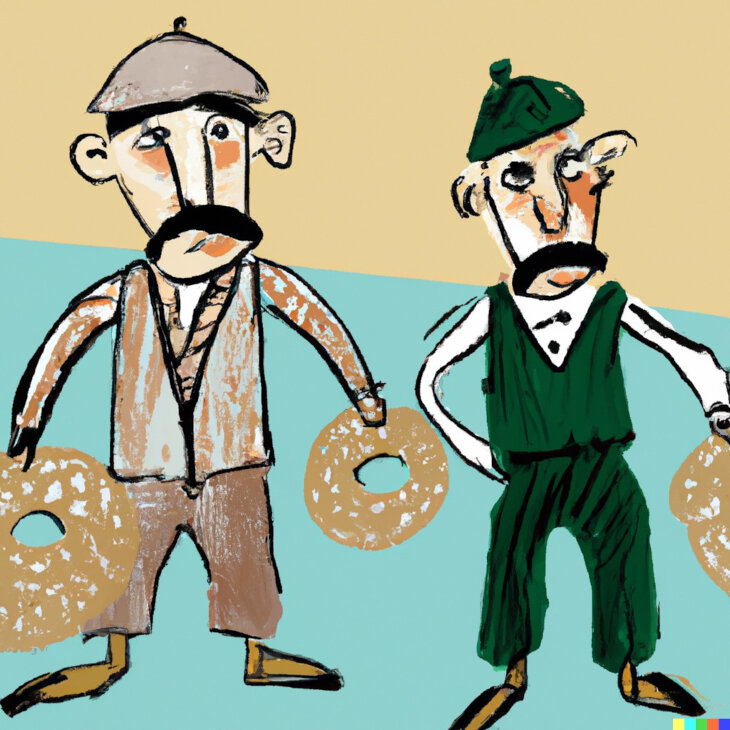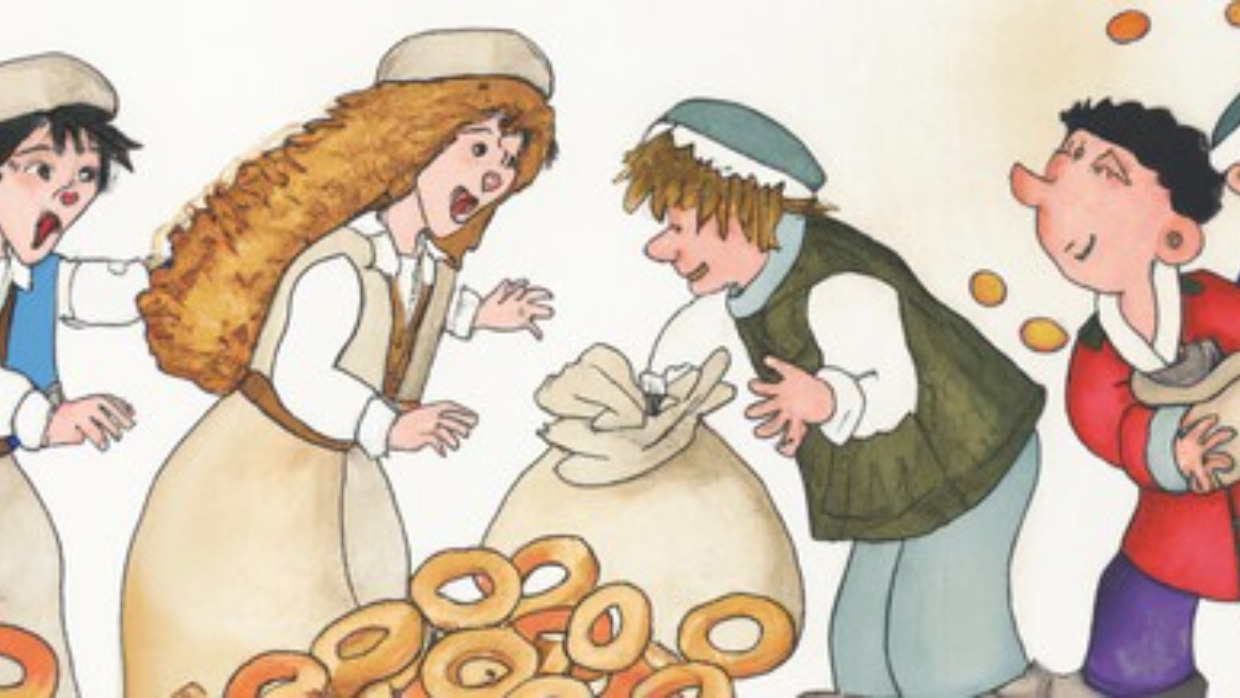While looking around the web for new interesting Jewish article ideas, I stumbled upon a fun experiment. Why not ask ChatGPT, the all-knowing, omnipotent chatbot, for article ideas? (Don't tell my editors I use AI.)
As I'm primarily a writer on Jewish food and culture, I asked ChatGPT for some factual Jewish stories that involve food.
Here are a few of the highlights of what the machine spat out:
Here are some lesser-known true stories that highlight the fascinating connection between Jews, Jewish communities, and food:
The Matzah Ball Miracle
During World War II, a group of Jewish prisoners in a concentration camp pooled their meager rations to make matzah balls, a traditional Passover dish. The communal act of preparing and sharing this symbolic food not only provided a momentary respite from their harsh reality but also strengthened their spirits and gave them hope.
The Secret Recipe of the Lost Gefilte Fish
In a remote village in Poland, a Jewish family possessed a secret gefilte fish recipe that had been passed down for generations. During World War II, as the family faced persecution, they entrusted the recipe to a non-Jewish neighbor for safekeeping. Miraculously, the recipe survived, and after the war, it was returned to the family, becoming a cherished symbol of resilience and cultural heritage.
The Pickle Peddler's Secret

In early 20th-century New York City, a Jewish pickle peddler named Sarah devised a unique way to preserve her pickles during the sweltering summer months. She buried barrels of pickles in her backyard, creating an underground pickle sanctuary that remained a secret until her grandchildren stumbled upon it decades later.
The Bagel Bandits

In the 1970s, a group of mischievous Jewish teenagers in a tight-knit Brooklyn neighborhood devised a plan to prank their neighbors. They formed a secret "bagel bandit" club and would stealthily deliver fresh bagels to doorsteps, leaving the recipients wondering who their mysterious benefactors were.
The Hidden Matzah in a Moroccan Palace
During the Middle Ages, Jewish communities in Morocco faced intense persecution, leading many families to practice their faith secretly. In one tale, a wealthy Jewish merchant hid a piece of matzah in a secret compartment within his palace. Each Passover, the family would gather, unveiling the hidden matzah as a symbol of hope and the enduring strength of their traditions.
Wow! Thank you, ChatGPT, for such sweet tales of community and camaraderie. Please provide sources for each story.
You'd assume that when asked for links and sources for these stories, ChatGPT would be able to provide references for these stories from its unlimited database of knowledge. Unfortunately, that’s because these stories never happened. While these stories would make wonderful children's books to read to my future kids, they aren’t exactly the stories we look for when we’re interested in learning about what really happened in Jewish communities.
When asked for information that ChatGPT doesn't have access to, it starts to make up new information regardless of any factual basis. The AI model, much like myself, doesn’t think before it speaks. It predicts the next word in the sequence based on the words that came before it, which leads to some funny results like the above.
It seems that when the machine with all the answers is faced with a situation where it doesn't have the answer, it reverts to classic Jewish stereotypes that have characterized the Jewish community for generations. While Gefilte Fish, Matzah, Pickles, and Bagels are certainly mainstays of Jewish cuisine, ChatGPT made up responses rooted in gross generalizations of Jewish cuisine culture.
Another article idea the AI gave me was about a special Jewish dish only found in Morocco:
“In the vibrant city of Marrakesh, Morocco, Jewish families specialized in the art of making confections. They crafted exquisite pastries like sefrou, a sweet and tangy orange blossom-scented cake. These delicacies became popular among both Jewish and Muslim communities, showcasing the harmonious coexistence and shared love for culinary delights.”
Now, not only is Sefrou, not an orange blossom cake, it's not even a real food. And while I think hundreds of thousands of Moroccan Jews would have loved to live in the utopian paradise ChatGPT has dreamt up, the Moroccan Jewish community experiences were anything but a harmonious co-existence. In fact, Muslim intolerance is precisely what led to the vast majority of the Jewish population leaving Morocco for Israel the minute they were able to.
The question we are left with is with ChatGPT, Claude, Dalle-2, and several other generative AI programs all rising to prominence over the past year and with the technology being fine-tuned each and every day. Despite that, they still are unreliable for research purposes and often provide misinformation. But what would happen if AI begins espousing downright malicious and anti-semitic rhetoric?
We've seen technological advancement and progress as a positive sign towards a more equitable, free, and happy society, but what happens when technology stops helping and starts to damage our happiness and freedoms?
All these questions are relevant as AI continues to grow and become more widely used. We are nearing a moral and ethical crossroads, where critical decisions about how we move forward with AI will need to be made. The effects of AI and this new wave of Web3 technologies are still largely unknown at this point. The best we can do is speculate on how these innovations will affect our lives. This brings us to AI and anti-semitism.
AI & Anti-Semitism
The Center for Countering Digital Hate conducted a study in April and found that when prompted about hot-button topics around hate, misinformation, and conspiracies, Google's Bard chatbot produced text with misinformation 78 out of 100 times, which seems dangerous and can potentially mislead a whole new generation that uses AI.
These discrepancies occur because of the way AI Models are built. Most Artificial Intelligence systems, such as ChatGPT, learn to complete sentences by analyzing enormous quantities of text created by people on the internet. It utilizes machine learning, which means that it improves its ability to respond correctly by utilizing the feedback it receives from real humans, and if that sounds scary…it is.
Due to AI chatbots' reliance on human input, they are also liable to pick up biases that are found in the digital database they are drawing from. This could be worrisome because of the immense anti-semitic bias that exists on the internet and in society at large. So much so that the Anti-Defamation League published a study in March showing that 2022 reached a new high of antisemitic incidents, a 36% rise from 2021.
While ChatGPT didn’t respond anti-semitically to my prompt, it clearly relied on stereotypes and biases. But what happens when AI responds with more malicious and unabashedly anti-semitic replies?
A glimpse into that ominous future could be seen in 2016 when Microsoft revealed a chatbot named Tay. This chatbot responded to Twitter users’ questions and, at first, seemed like a great success. However, after just days of being online, it posted several pro-Nazi tweets, revealing stances it likely adopted as a result of being fed millions of tweets, with many of them sharing those heinous beliefs.
How to Prevent Anti-Semitic AI
One of the factors that makes Antisemitism particularly challenging to tackle in generative AI is that anti-semitism takes on many different shapes. It can be a picture, a phrase, a veiled generalization, or a stereotypical food story that sets it off.
“There’s no doubt that many exciting technological advancements are possible with the increased access to GAI (Generative Artificial Intelligence),” said Yael Eisenstat, vice president of the ADL Center for Technology and Society. “But this technology may be abused to further accelerate hate, harassment, and extremism online. As lawmakers and industry leaders prioritize innovation, they must also address these challenges to prevent their misuse. We look forward to working with policymakers, industry leaders, and researchers as they establish standards for GAI.”
Israeli Prime Minister Benjamin Netanyahu sat down with Elon Musk this month and discussed AI and Anti-semitism. Netanyahu explained that his best idea for limiting hate speech by AI chatbots starts with bringing like-minded states to agree to a code of ethics and code of conduct to foster the benefits and “curb the curses [of AI].”
The importance of this conversation is emphasized by the fact that Musk’s social media site has been accused of permitting antisemitic remarks by the Anti-Defamation League. With CEO of the ADL, Jonathan Greenblatt, claiming that Musk has "amplified" the messages of neo-Nazis and white supremacists on his platform.
One of the leading ideas proposed by advocates of policing AI is to blacklist certain websites known for anti-semitism from being fed to the AI during its machine learning phase. Another solution that has been advocated is by adding guardrails and a list of “banned” words and topics.
Elon Musk is outspoken in the AI sector and holds a critical role in the artificial intelligence world as he is the co-founder of Open AI (the company behind ChatGPT and Dalle-2).
In the past, he has criticized many of these initiatives for being too "woke" and is staunch in his belief in freedom of speech, even when it comes to anti-semitic and racist rhetoric. Musk isn’t alone in feeling that way. With many of these efforts facing considerable opposition, it remains to be seen whether any of the large AI programs will implement it.
While I may be left without an idea for a new article, I am reminded of the dangers of AI and of the work we need to do to prevent perpetuating inaccurate stereotypes and prejudices. That, to me, is the mission of Aish’s food section at large. We are here to show that Jewish food isn’t just matzah balls and gefilte fish and that Jewish people aren’t just Eastern Europeans with big noses like Bradley Cooper might lead you to believe. Jewish culture is a vast tapestry of customs, traditions, and, of course, recipes. Hopefully, through my writing and other articles here, AI might be able to pick up on more of the nuance in Jewish culinary tradition.

















